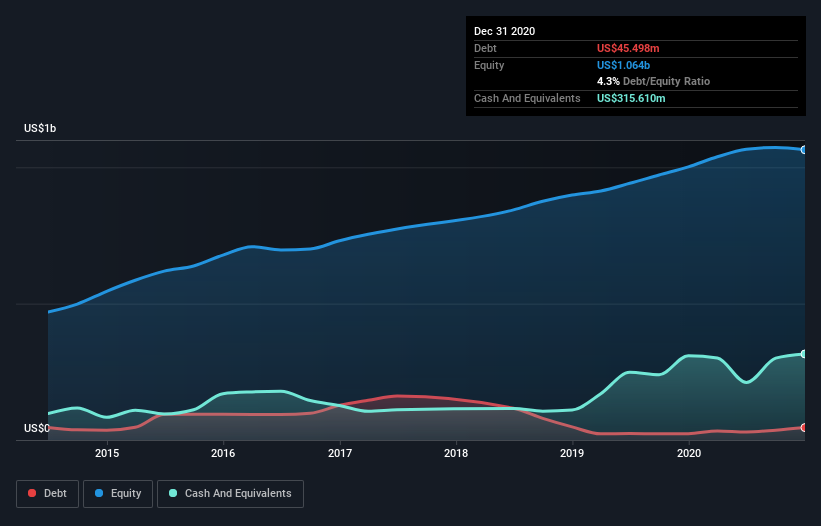We Think Super Micro Computer (NASDAQ:SMCI) Can Manage Its Debt With Ease
The external fund manager backed by Berkshire Hathaway's Charlie Munger, Li Lu, makes no bones about it when he says 'The biggest investment risk is not the volatility of prices, but whether you will suffer a permanent loss of capital.' When we think about how risky a company is, we always like to look at its use of debt, since debt overload can lead to ruin. We can see that Super Micro Computer, Inc. (NASDAQ:SMCI) does use debt in its business. But should shareholders be worried about its use of debt?
When Is Debt A Problem?
Debt and other liabilities become risky for a business when it cannot easily fulfill those obligations, either with free cash flow or by raising capital at an attractive price. Part and parcel of capitalism is the process of 'creative destruction' where failed businesses are mercilessly liquidated by their bankers. While that is not too common, we often do see indebted companies permanently diluting shareholders because lenders force them to raise capital at a distressed price. Of course, plenty of companies use debt to fund growth, without any negative consequences. The first thing to do when considering how much debt a business uses is to look at its cash and debt together.
Check out our latest analysis for Super Micro Computer
What Is Super Micro Computer's Net Debt?
You can click the graphic below for the historical numbers, but it shows that as of December 2020 Super Micro Computer had US$45.5m of debt, an increase on US$23.3m, over one year. However, its balance sheet shows it holds US$315.6m in cash, so it actually has US$270.1m net cash.
A Look At Super Micro Computer's Liabilities
We can see from the most recent balance sheet that Super Micro Computer had liabilities of US$673.0m falling due within a year, and liabilities of US$156.9m due beyond that. On the other hand, it had cash of US$315.6m and US$393.3m worth of receivables due within a year. So its liabilities total US$121.0m more than the combination of its cash and short-term receivables.
Of course, Super Micro Computer has a market capitalization of US$1.86b, so these liabilities are probably manageable. But there are sufficient liabilities that we would certainly recommend shareholders continue to monitor the balance sheet, going forward. While it does have liabilities worth noting, Super Micro Computer also has more cash than debt, so we're pretty confident it can manage its debt safely.
Fortunately, Super Micro Computer grew its EBIT by 6.1% in the last year, making that debt load look even more manageable. When analysing debt levels, the balance sheet is the obvious place to start. But it is future earnings, more than anything, that will determine Super Micro Computer's ability to maintain a healthy balance sheet going forward. So if you're focused on the future you can check out this free report showing analyst profit forecasts.
Finally, while the tax-man may adore accounting profits, lenders only accept cold hard cash. Super Micro Computer may have net cash on the balance sheet, but it is still interesting to look at how well the business converts its earnings before interest and tax (EBIT) to free cash flow, because that will influence both its need for, and its capacity to manage debt. Over the last three years, Super Micro Computer actually produced more free cash flow than EBIT. That sort of strong cash generation warms our hearts like a puppy in a bumblebee suit.
Summing up
While it is always sensible to look at a company's total liabilities, it is very reassuring that Super Micro Computer has US$270.1m in net cash. The cherry on top was that in converted 114% of that EBIT to free cash flow, bringing in US$21m. So is Super Micro Computer's debt a risk? It doesn't seem so to us. We'd be very excited to see if Super Micro Computer insiders have been snapping up shares. If you are too, then click on this link right now to take a (free) peek at our list of reported insider transactions.
When all is said and done, sometimes its easier to focus on companies that don't even need debt. Readers can access a list of growth stocks with zero net debt 100% free, right now.
This article by Simply Wall St is general in nature. It does not constitute a recommendation to buy or sell any stock, and does not take account of your objectives, or your financial situation. We aim to bring you long-term focused analysis driven by fundamental data. Note that our analysis may not factor in the latest price-sensitive company announcements or qualitative material. Simply Wall St has no position in any stocks mentioned.
Have feedback on this article? Concerned about the content? Get in touch with us directly. Alternatively, email editorial-team (at) simplywallst.com.


